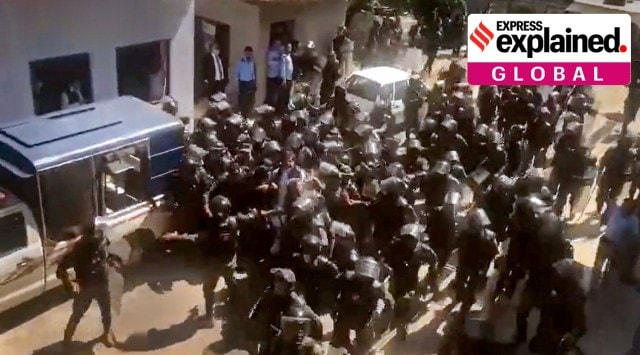Imran Khan’s dramatic arrest: What is the Al-Qadir Trust case?
While Imran Khan faces over a 100 cases, including of inciting violence and treason, his arrest has come in the Al-Qadir case, Pakistani media reported.
 Former prime minister of Pakistan Imran Khan being arrested by paramilitary Rangers from outside the Islamabad High Court. (Twitter: PTI)
Former prime minister of Pakistan Imran Khan being arrested by paramilitary Rangers from outside the Islamabad High Court. (Twitter: PTI) Former Pakistan Prime Minister Imran Khan was arrested by authorities on Tuesday from outside the Islamabad High Court, where he had arrived to attend two hearings in separate cases.
PTI reported that Khan was undergoing a biometric process at the court when paramilitary Rangers broke open the glass window and arrested him after beating lawyers and Khan’s security staff.
Rangers abducted PTI Chairman Imran Khan, these are the visuals. Pakistan’s brave people must come out and defend their country. pic.twitter.com/hJwG42hsE4
— PTI (@PTIofficial) May 9, 2023
According to Dawn, Inspector General Police Islamabad (IG) Akbar Nasir Khan in a statement said Imran had been detained in the Al-Qadir Trust case, in which the former prime minister and his wife have been accused of receiving “billions of rupees from a real estate firm for legalising a laundered amount of Rs 50 billion.”
He also added that the situation in Islamabad was “normal” and Section 144 had been imposed in the city.
Meanwhile, Interior Minister Rana Sanaullah told the media that Imran has been detained in the case after he repeatedly failed to appear before the court despite being issued several notices.
“The arrest has been conducted by the National Accountability Bureau for causing losses to the national treasury,” he added.
How have Imran’s supporters reacted?
Speaking about the arrest, Imran’s close aide and his party Pakistan Tehreek-e-Insaf (PTI) leader Fawad Chaudhry tweeted, “Former PM Imran Khan has been abducted from Court premises, scores of lawyers and general people have been tortured, Imran Khan has been whisked away by unknown people to an unknown location, CJ Islamabad High Court has ordered Secy interior and IG police to appear within 15 min in the court”.
PTI’s official Twitter handle shared a video, which shows Imran being taken away by paramilitary personnel in a vehicle. It also shared a video of Imran’s lawyer, claiming that he was “badly injured inside the premises of IHC.”
Imran Khan’s lawyer badly injured inside the premises of IHC. Black day for our democracy and country. pic.twitter.com/iQ8xWsXln7
— PTI (@PTIofficial) May 9, 2023
While the arrest has led to protests in support of Imran in several cities across Pakistan, the PTI Secretary General Asad Umar has announced that a six-member party committee would soon determine the next course of action.
What is the Al-Qadir Trust case?
Dawn reported that the former prime minister, along with his wife Bushra Bibi and other PTI leaders, are facing a National Accountability Bureau (NAB) inquiry for allegedly “accepting Rs 5 billion and hundreds of kanals (of land) from Bahria Town (an Islamabad-based real estate company) in exchange for protecting the firm in a money laundering case.”
It also said that the land was given to the accused in the form of a “donation” to a non-profit organisation, Al-Qadir Trust, to set-up a university. Notably, the organisation had only two trustees: Imran and Bushra Bibi. The allegation is that the settlement between the firm and the PTI government caused a loss of 190 million pounds to the national exchequer.
Last year in June, Interior Minister Rana Sanaullah held a press conference to announce the formation of a committee to look into the allegations against Imran. He had said, “Bahria Town had illegally transferred Rs 50 billion to a Pakistani national in the UK who was caught by the British National Crime Agency (NCA), which subsequently informed the then PTI government about the laundered money”.
“Imran Khan tasked his frontman Shahzad Akbar with resolving the money laundering case. Akbar settled the entire case, and the Rs 50 billion (190 million pounds at the time), which was state property and belonged to the national treasury, was adjusted against Bahria Town’s liability in a case being heard in the Supreme Court,” he he had told the media, adding that Imran and his wife got money through Akbar.
As per a Dawn report, the arrest warrant in the case against Imran was issued on May 1, saying that he is “accused of corruption and corrupt practice under Section 9(a) of the National Accountability Ordinance, 1999.”
- 01
- 02
- 03
- 04
- 05






































